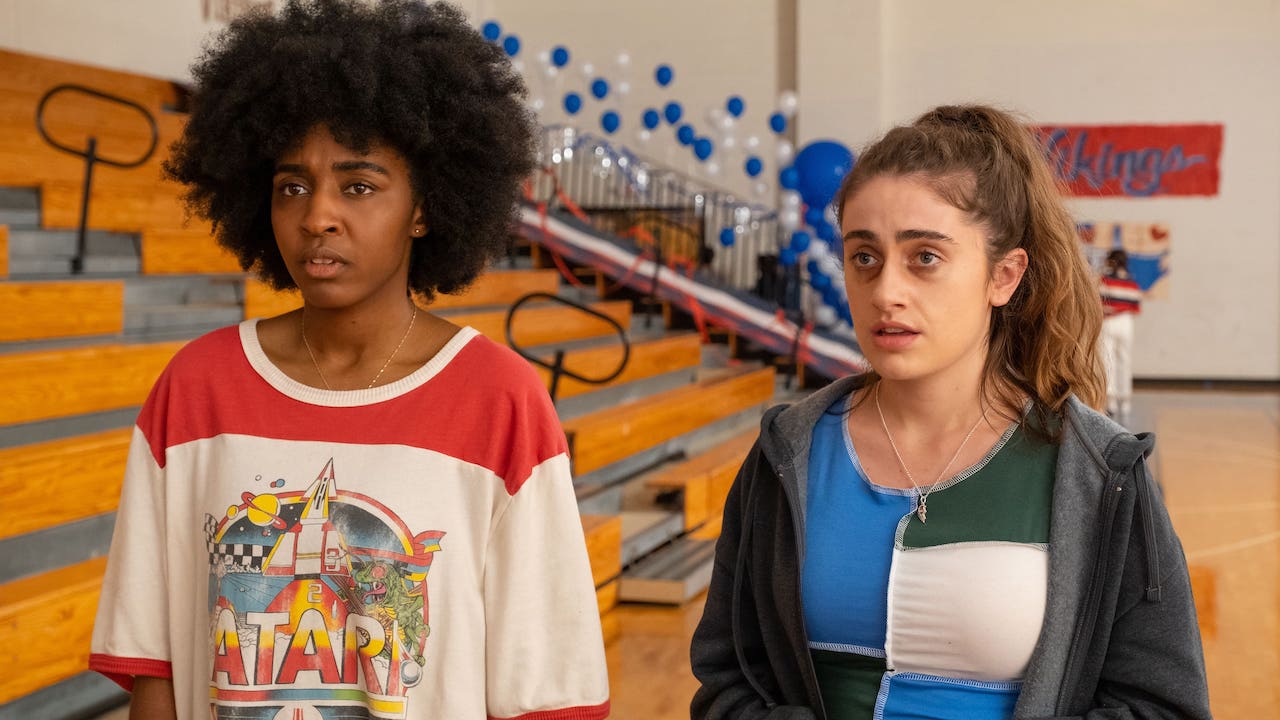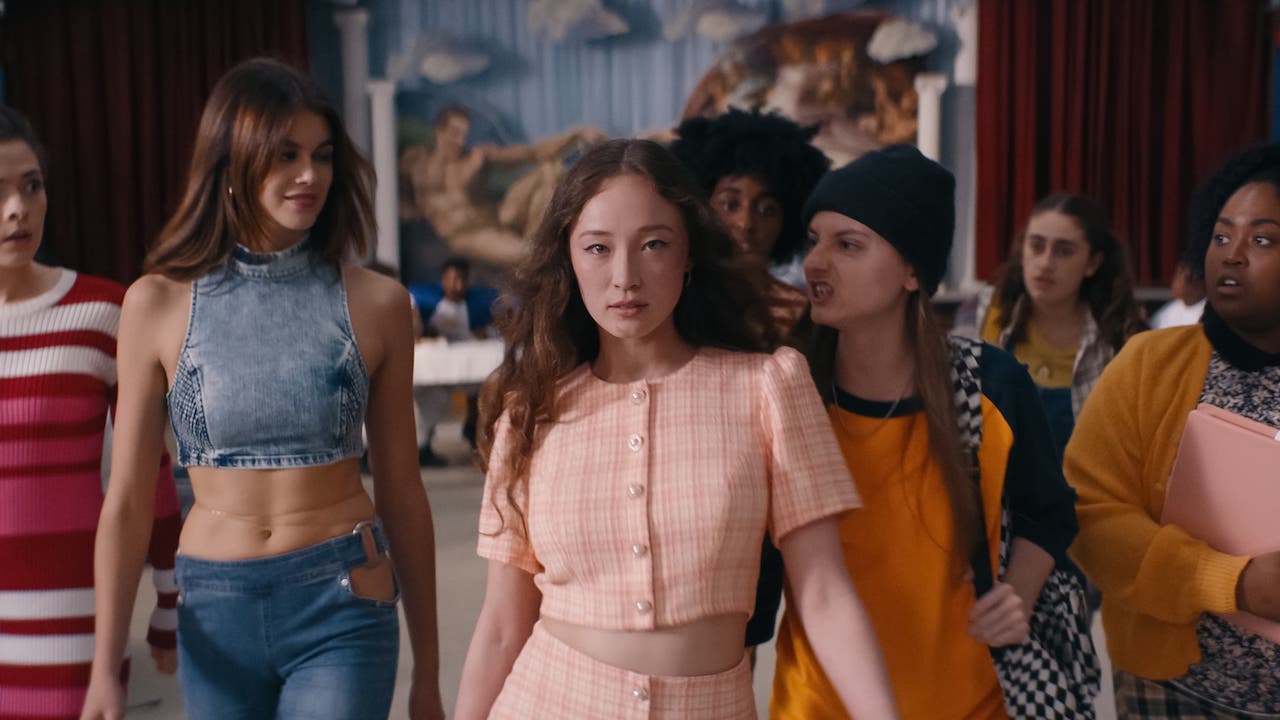Bottoms isn’t as much fun as a lesbian teen fight club movie should be

Queer high-school fight club comedy Bottoms sounds like a blast—but confusing tone and laid-back humour keep it out of the big leagues of teen movie classics. Eliza Janssen says it’s not tops.
The tagline on the Bottoms’ movie poster was divisive. Some critics and audiences, hoping for a wholesome, inclusive tale of lesbian friendship, were put off, but I was sucked in: “A movie about empowering women (the hot ones)”. It suggested something arch, something shiny and nasty—in the mode of nineties and noughties high-school comedies such as Bring It On, Clueless, or even the dark laughs of Heathers.
Like those classics, Bottoms gives its teen characters impossibly grown-up, bitchy dialogue, and larger-than-life scenarios, though which to prove their mettle in the cruel hierarchy of teen society.
Unlike those movies, Emma Seligman’s sophomore feature lacks anything more memorable, more provocative for viewers to latch onto. Bring It On isn’t just about the flirty ridiculousness of cheerleading; it’s about intersectional feminism and cultural appropriation. Clueless isn’t glossy, Beverly Hills empty calories; it ingeniously follows a young girl coming into her powers of empathy and self-sacrifice, through the lens of Austenian social comedy.
What deeper insight does Bottoms offer, beyond proving that uni mates Rachel Sennott and Ayo Edebiri are incredibly charming and watchable? Well, you might argue, deeper insight shouldn’t matter, for what’s been pitched to us as a raucous queer sex comedy. As long as it’s funny, right? And there’s the problem: Bottoms simply isn’t hilarious enough to get away with its weak structure and half-assed tonal choices.
The Bear star Edebiri and Sennott, reuniting with director Seligman after their indie hit Shiva Baby, star as teen outcasts Josie and PJ—gender-swapped versions of the same lovelorn male nerds we’ve been sympathising with since the dawn of the high school movie. They yearn for straight gals Isabel (Havana Rose Liu) and Brittany (mini Cindy Crawford, Kaia Gerber), and a series of convoluted fibs leads to the unpopular lesbian besties starting a female self-defence club in the school gym.
Already, we’re off to a slightly confused start: PJ and Josie begin the fight club as a mere excuse to rub up against their hetero love interests, pitching the women’s group as an important safety measure against a rival school’s violent hazing. We’re never shown whether this external threat is legit or not…until a bonkers, suddenly mortally serious third-act twist changes the whole game. Simultaneously, sweet innocent club supporter Hazel (Ruby Cruz) calls PJ and Josie’s scheme a sorely-needed feminist “safe space”: for some reason, all the girlies will claim that they’ve found an intimate sisterhood with one another, over the course of a few comedic beatdown montages.
We the audience are not treated to proof of either of these plot threads, which fail to earn their big emotional conclusions in the movie’s scattershot finale. It becomes impossible to determine which elements of Bottoms’ OTT, surreal teen world are there for shits and gigs, and which are to be taken seriously. Is it the kind of movie where an adult school principal might realistically announce, “could the ugly, untalented gays please report to the principal’s office?” I guess so. But that doesn’t jibe with a lengthy, sensitive second-act crises scene set to Avril Lavigne’s “Complicated” (admittedly an iconic needledrop).

Seligman and Sennott’s script needed to vault upwards into entirely ridiculous, unmoored camp, or to settle into the grounded, raw quality of their successful first film Shiva Baby. Either way, a solid sense of direction is sorely missing here.
What about the jokes, then? Edebiri confirms herself as a rising comedy star, perhaps not exhibiting too much contrast from her anxious The Bear character but still winning our sympathy with every self-effacing line and expression. Liu and Gerber are at exact opposite ends of the spectrum in their oblivious straight-girl roles: Liu is as refreshing, real, and surprisingly scene-stealing as Gerber isn’t. And Marshawn Lynch’s improv as the club’s misguided supervisor is a bright spot in the movie’s welcome end-credits blooper reel.
All in all, though, I won’t remember any big, gut-busting laughs from Bottoms. Despite the warnings of the movie’s attention-grabbing marketing, it did not “turn me gay”. Sorry. As a unique synthesis of old-school/high-school stories with ultra-modern sapphic humour, the movie certainly has its moments. But they’re disparate, failing to clot together as one bloody, shocking, and—most essentially—funny whole.
The first rule of this fight club, then, might be to not expect too much.

















